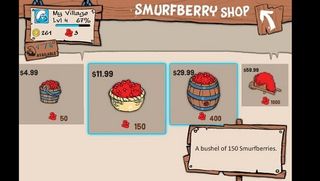The Federal Trade Commission has confirmed it will investigate mobile games that are advertised as free but then entice players into buying virtual goods within the game, especially those that target younger users. This comes after several complaints surfaced by parents who found out their children were racking up huge purchases without understanding what they were doing, includingone young gamerwho managed to download more than $1,400 in virtual Smurfs currency.

Smurfs Village leads the headlines for this story. It's a "free" iPhone game clearlytargeting a young demographic. Once in the game, players are asked to spend Smurfberries at every turn. That problem is solved easily enough with a menu that offers the ability to buy more berries. Even though Smurfberries aren't real, the money used to buy them is.
Players are lured in by enticing pictures of huge bucketfulls of Smurfberries, and just a couple taps is all it takes to drain money out of aniPhone account holder's credit card and make players flush with in-game funds.
The app does ask users to confirm purchases, but as the FTC notes, some users may not fully understand what they're confirming. "Consumers, particularly children, are unlikely to understand the ramifications of these types of purchases," wrote FTC chairman Jon Leibowitz in a statement.
Massachusetts Congressman Edward Markey responded, "What may appear in these games to be virtual coins and prizes to children result in very real costs to parents. I am pleased that the FTC has responded, and as the use of mobile apps continues to increase, I will continue to actively monitor developments in this important area."
The Smurfs game has gained so much attention because itexploded to the #1 spotof top-earning iPhone games. That's when the media learned of the easy microtransaction system in the game. There's even a button to purchase $100 in Smurfberries, which most rational, hard-working people would probably never click, but appears mouthwatering to players who think they're just innocently playing a game.
While some of the charges definitely come as the result of a parent legitimately buying berries for their kid, there is also controversy over the 15-minute user authentication buffer. A dad could download the Smurfs game onto his iPad and hand it over to his daughter to play. The daughter can then rack up as many charges as she wants for 15 minutes before the app will ask for re-verification of the account. Before you know it, your credit card statement's been smurfed right in the smurf.
Sign up to the 12DOVE Newsletter
Weekly digests, tales from the communities you love, and more
Source: [Fierce Mobile Content]
Feb 23, 2011
Got a news tip? Let us know at [email protected]
Most Popular








